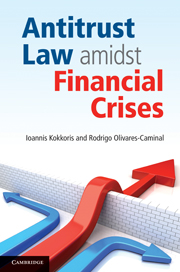Book contents
- Frontmatter
- Contents
- Foreword by Philip Lowe
- Foreword by Frederic Jenny
- Preface
- Table of cases
- Table of treaties and other international instruments
- Introduction
- 1 Introduction to competition law: EU, US and UK
- 2 Some notes on crises
- 3 Failing-firm defence
- 4 Efficiencies
- 5 Crisis cartels
- 6 State aid (Phedon Nicolaides)
- 7 Competition enforcement in periods of crisis
- 8 Conclusion
- Index
6 - State aid (Phedon Nicolaides)
- Frontmatter
- Contents
- Foreword by Philip Lowe
- Foreword by Frederic Jenny
- Preface
- Table of cases
- Table of treaties and other international instruments
- Introduction
- 1 Introduction to competition law: EU, US and UK
- 2 Some notes on crises
- 3 Failing-firm defence
- 4 Efficiencies
- 5 Crisis cartels
- 6 State aid (Phedon Nicolaides)
- 7 Competition enforcement in periods of crisis
- 8 Conclusion
- Index
Summary
In Europe the provision of subsidies and other forms of aid by the State still forms an accepted part, indeed often a central part, of economic policy, even in those countries most attached to the model of the free market. Yet the very existence of State aid poses obvious problems for the single market for which the European Union is striving. The EC law of State aid therefore raises issues of the greatest social, economic and political importance as well as a great variety of difficult and fascinating legal problems. Seldom have the rules of Community law on State Aids been invoked more frequently than at present. Seldom has the definition of a State aid presented more difficulty.
Andrea Biondi, Prof. Piet Eeckhout and James FlynnIntroduction
This chapter explains in detail the concept of state aid. In the penultimate chapter we shall examine how the state aid rules of the European Union have been applied during the financial crisis, and we present there a critical assessment of the role and effectiveness of state aid policy during the crisis.
The control of state aid is an important component of the competition policy of the European Union. State intervention influences the way markets operate by favouring certain undertakings and causing, as a result, serious damage to their competitors operating in the same and/or different member states.
State intervention may thus undermine the achievement of a market economy with free and undistorted competition.
- Type
- Chapter
- Information
- Antitrust Law amidst Financial Crises , pp. 349 - 388Publisher: Cambridge University PressPrint publication year: 2010



